TODAY Youth Survey: Majority more fearful, less sociable due to Covid-19 but hopeful of ‘better’ life a year from now
SINGAPORE — A survey commissioned by TODAY has found that most millennials have become more fearful (58 per cent) and less sociable (54 per cent) because of the pandemic, though more than half (59 per cent) are still optimistic about the future, believing that life will be better a year from now.
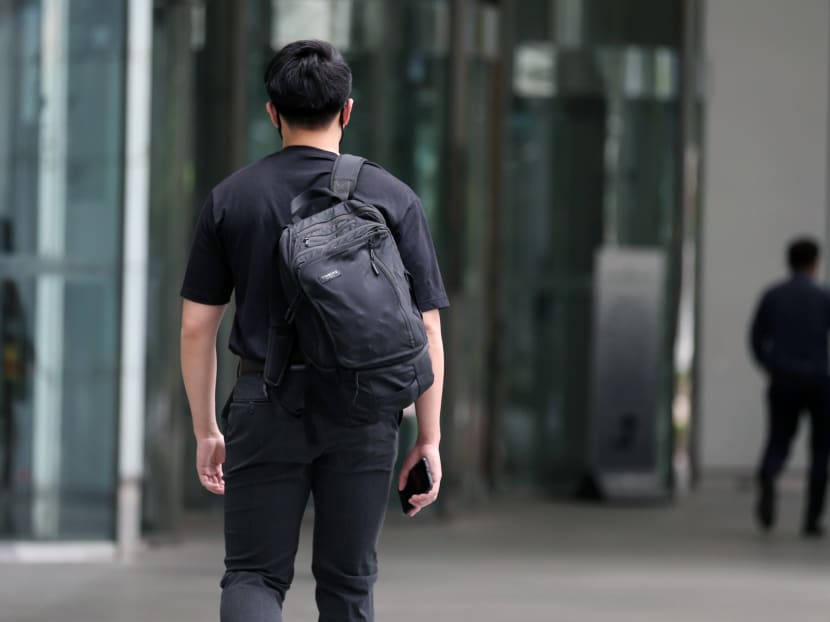
When young people were asked in a survey by TODAY about the most common mental states that they had experienced in the past three months, 41 per cent said that they were “stressed out”, “anxious” (37 per cent), “calm” (31 per cent), “overwhelmed” (28 per cent) and “happy” (25 per cent).
- Fifty-eight per cent of youth surveyed said they have become more fearful because of the pandemic
- But 59 per cent were optimistic that life would be better a year from now
- Still, the top two feelings that respondents had in the last three months or so were "anxious" and "stressful"
- A counsellor believes the frustration that young people are feeling about the pandemic restrictions is the main stressor
- The survey also asked about their financial goals, and having enough funds to retire early came up tops
SINGAPORE — A survey commissioned by TODAY has found that most millennials have become more fearful (58 per cent) and less sociable (54 per cent) because of the pandemic, though more than half (59 per cent) were still optimistic about the future, believing that life would be better a year from now.
Still, in the midst of the ennui and uncertainty brought on by the pandemic, the majority of millennials surveyed (59 per cent) said that their top financial goal in life was to just retire early.
These were among the findings from the inaugural annual TODAY Youth Survey, which sought to give voice to millennials and Gen Zers on societal issues and everyday topics close to their hearts.
TODAY Youth Survey 2021 polled 1,066 respondents aged between 18 and 35 at the start of October about their views regarding various social issues, their goals and their sentiments about the pandemic.
The wide-ranging survey, which is demographically representative, covers six topics: Racism, religion, LGBTQ (lesbian, gay, bisexual, transgender and queer) attitudes, gender dynamics, the impact of Covid-19 on mental well-being and social ties, and career and material success.
By and large, the survey findings painted a picture of the younger generations still grappling with the emotional, mental and economic impact of living through a crisis that has affected every aspect of their lives.
In several instances, the survey reflected the conflicted feelings that Singapore’s young were dealing with as they navigated their way through pandemic life.
For example, while 63 per cent of respondents said they were still optimistic that they could build a successful career in a field they were interested in despite the pandemic, 55 per cent felt that their economic prospects had been dimmed by the Covid-19 crisis.
In another section of the survey, when asked about the most common mental states they had experienced in the past three months, the top two chosen were “stressed out” (41 per cent) and “anxious” (37 per cent), but close behind was “calm” (31 per cent).
Rounding up the top five were “overwhelmed” (28 per cent) and “happy” (25 per cent).
Mr Syahir Ezekiel Rafa’ee’s life reflects this mix of optimism and anxiety. He is presently doing freelance jobs such as sports coaching and photography, even though he had initially planned to enter the fitness industry, having progressed in his career to become a manager of a gym.
His plans were scuppered by Covid-19, and he found himself feeling increasingly anxious about his future as pandemic restrictions affected his business.
“I was living quite badly and anxious about things on a daily basis,” the 31-year-old said. “When there are uncertainties and things I can’t control, it will trigger my anxiety.”
He said that although he used to have anxiety attacks even before the pandemic, it has become more frequent since.
Then, a turning point came when he decided to make a career switch to the education industry. He has been offered a role as a speech and drama teacher in Guangzhou, China. He was supposed to leave in August, but he is still waiting for his visa to be approved.
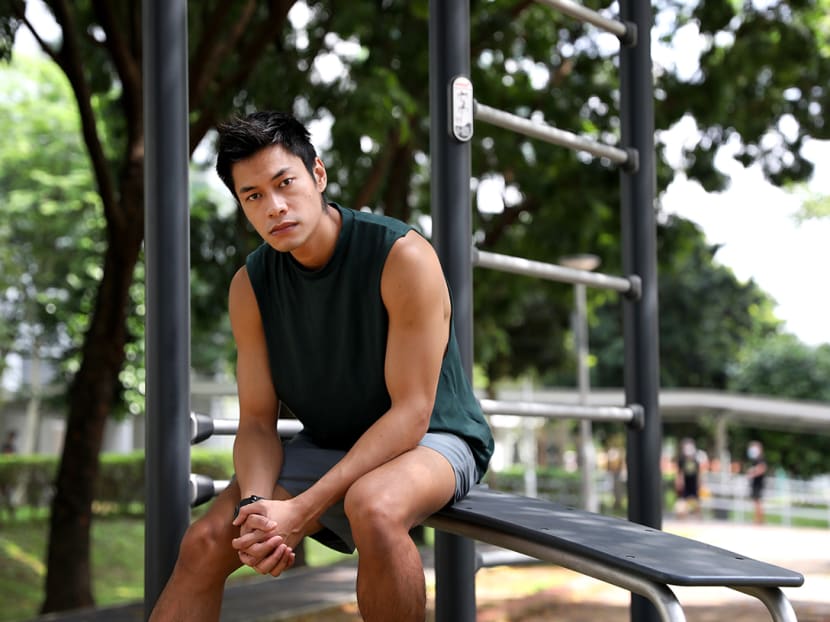
His decision to switch careers — he left his role as gym manager in July — has revitalised his view of the future.
“At the end of the day, if you ramble and wallow in self pity, you will be stuck,” he said. “It’s not too late to do something for yourself… take action on what you can control.”
Mr Adrian Choo, founder of career consulting company Career Agility International, said that the pandemic may loom large for young people just starting out in their jobs. However, such a crisis is not unprecedented and many previous graduating students have been through such turbulence before, such as during the 1997 and 2008 financial crises.
Agreeing with Mr Syahir’s approach, Mr Choo said: “The big question is what can you do to stay positive and drive your own career forward. There's no point worrying about things you can’t control.”
Another youth, Ms Chloe Tan, said that if not for Covid-19, she would not have had the opportunity or vision to discover the job she now holds in a venture capital firm.
The 22-year-old said that she had wanted to enter the travel industry after graduating from a polytechnic with a degree in communications and media. That was, until the pandemic ground international travel to a halt.
So she joined the SG United Traineeship programme at the start of the pandemic last year with a technological startup for six months and went on a traineeship with the venture capital firm.
She said that the pandemic presented a rare opportunity, where everyone was re-learning how to deal with a new normal.
“During this pandemic, it felt like everyone was back at ground zero, trying to figure things out,” Ms Tan said. “I didn’t feel like I was in front or behind people (and) I’m still excited for what’s to come.”

YOUNG PEOPLE MORE CAUTIOUS AND FEARFUL
The survey also showed that because of the pandemic, 59 per cent of the youth have become more cautious and fearful, compared with 39 per cent who have become more risk-taking and fearless.
And because of the pandemic, less than half, or 48 per cent, said that they were able to still live their lives to the fullest.
Compared with before the pandemic, 54 per cent of respondents also said that they have become less sociable.
On the other hand, 53 per cent said that relationships with family members and friends have become stronger compared to before the pandemic, while 35 per cent said that their relationships with family members and friends have deteriorated.
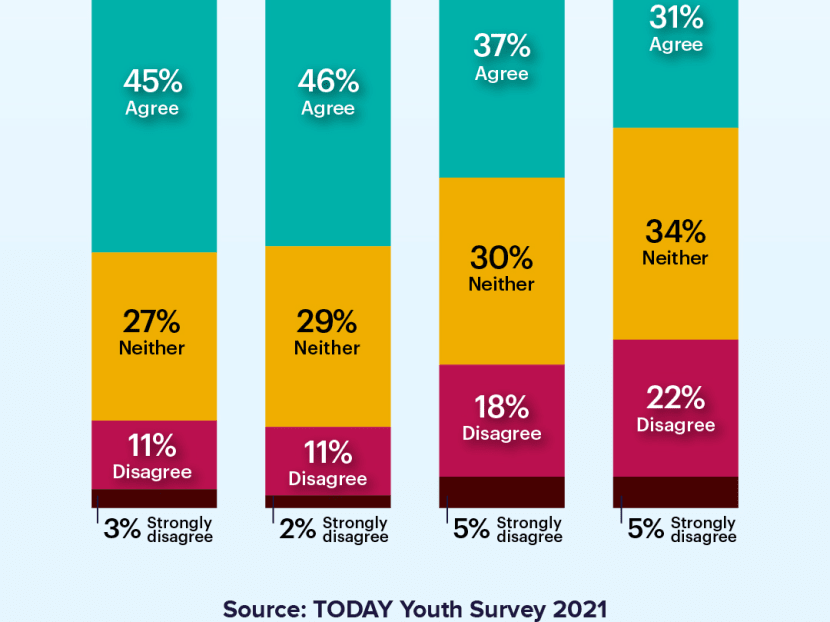
Mr Praveen Nair, a counsellor at Raven Counselling and Consultancy, believes the frustration that young people are feeling about the pandemic restrictions is the main stressor.
Current safety rules, such as a cap of two people for each social gathering do not allow for much socialisation, and this can tremendously affect a young person’s development, he said.
“Development involves identity and autonomy, and a lot of that is through socialisation,” he added. “And this is more so a factor for adolescents who want to go out and be with their friends. Even adult clients of mine are frustrated, angry and facing mental health issues.”
Still, the survey showed that 59 per cent of young people were optimistic that their future would be better one year from now.
However, Mr Nair said that more attention should be paid to the other 41 per cent of respondents.
This group of people may be either apathetic or pessimistic about the future because their psychosocial equilibrium has been tipped towards feeling negative, he said.
Likening a person's psychological state to a balancing scale, he said that the “positive weights” such as socialisation and career stability have been partially taken away for many due to Covid-19.
In their place, there are now more “negative weights” such as depression, job instability and loneliness.
“The equilibrium will be affected in crazy profound ways, and this makes it very difficult for (the youth)... for them, it will seem like a never-ending disaster that is getting worse and worse.”
WHAT MATERIAL SUCCESS MEANS
Looking beyond the pandemic and into the longer term, the survey also asked respondents what they felt were the top indicators of material success.
For 59 per cent, the answer was having enough money to retire early, while 52 per cent hoped for passive income from financial investments, and for 48 per cent, the ability to travel twice or more a year.
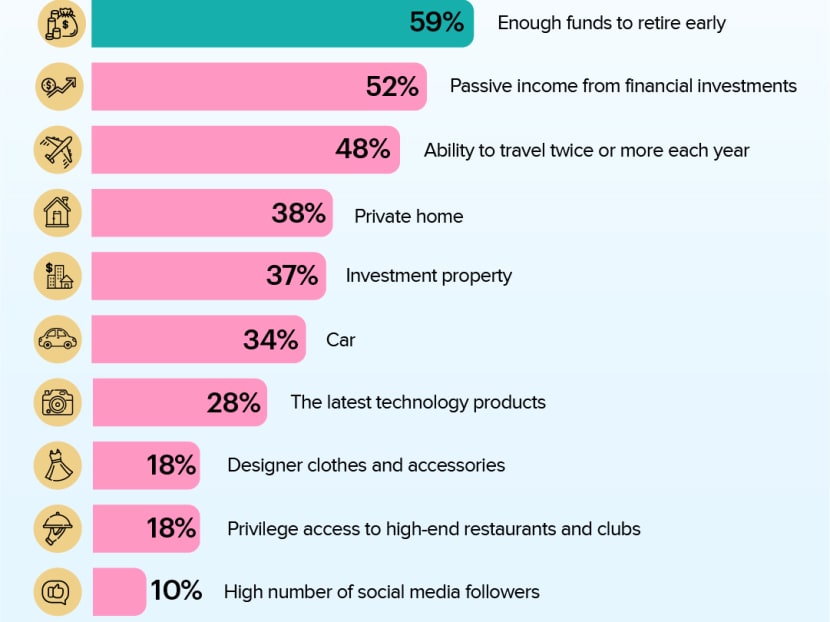
Ms Tan said that although she still wants to earn money and have a good start in her career, she has observed a shift in people focusing on post-materialist values such as finding purpose in what they do.
Mr Choo of Career Agility International said it is not surprising that young people prioritise these three indicators of success, but retiring early requires a tremendous amount of capital to realise.
He likened this finding to the Financial Independence, Retire Early (Fire) lifestyle movement.
“The young adults who do this will work like crazy and save for the first 10 years of their lives so that by the time they are 35 or 40 they are ready to retire,” he said.
They also achieve this by putting their money into investments and being extremely frugal about spending on non-necessities.
While feasible, the exertions will come at a cost, with the young person possibly experiencing burnout and health issues in the pursuit of this goal, Mr Choo said.
“It’s all about balance and being realistic.”
The survey also asked the youth what were the most important factors in their working lives.
Having good colleagues or bosses, work-life balance and financial rewards were the top three factors mentioned, with almost nine in 10 respondents indicating that these were either “important” or “very important”.
In comparison, good advancement prospects and a sense of purpose were the answers given by a slightly smaller proportion (80 per cent).
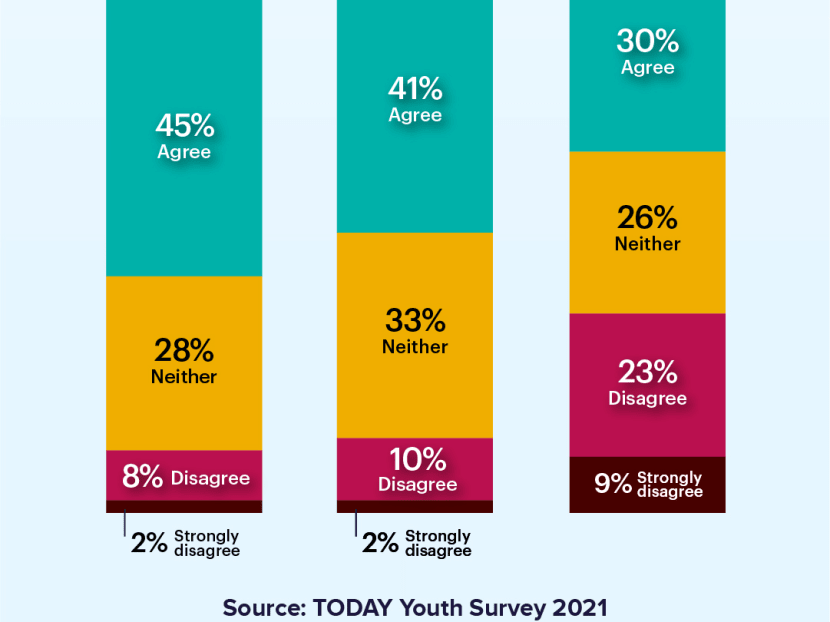
This is the first instalment of a five-part series on the findings of the TODAY Youth Survey 2021. Look out for our daily reports this week on the survey topics of racism, religion, LGBTQ attitudes, gender dynamics, the impact of Covid-19 on mental well-being and social ties, and career and material success. We will also be holding a webinar series on Instagram and TikTok to discuss the survey findings.











